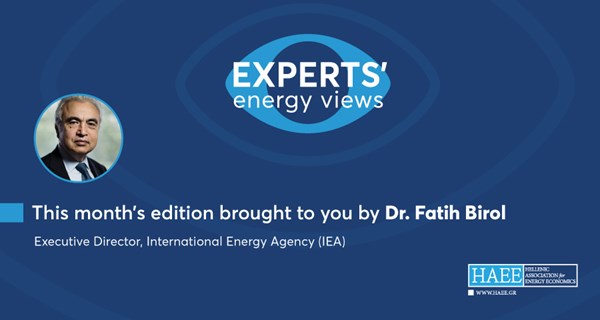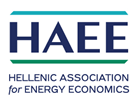Read the latest "Experts' Views" issue! This month's edition hosts the article of Dr. Fatih Birol, Executive Director of the International Energy Agency, who illustrates the new geopolitical state of play in the energy landscape, pointing out the necessity of bold policies and structural changes to enhance energy security and supercharge renewable energy. A time for urgency, not complacency, in Europe After a tumultuous year in 2022, the energy crisis roiling Europe has entered a period of relative calm. Natural gas prices have returned to more manageable levels compared to last year, European natural gas storage sites are well stocked and the mild winter weather combined with timely policy action has helped shield the region from the risk of supply shortages. Crucially, the European Union has moved mountains in a short period of time to respond to Russia’s cuts in gas supply, securing deliveries from alternative sources and bringing down demand through steps such as deploying more renewables, installing heat pumps and using energy more efficiently. While this is all welcome news, there are still major challenges ahead for which Europe must prepare itself. Firstly, the global market for liquefied natural gas (LNG) might not be as favourable for Europe this year as it was in 2022. Pivoting to LNG and building up import capacity quickly has been one of the key elements of Europe’s success in reducing reliance on Russian pipeline gas. But international competition for LNG could be fiercer this year. China was the world’s largest importer of LNG in 2021 and is now emerging from an economic downturn after lifting its significant Covid restrictions. The country’s lockdown measures last year meant substantial LNG volumes were available to reach Europe’s shores. In Greece, for example, LNG imports rose by over 50% in 2022. But if China’s demand rebounds strongly, policy makers must be prepared for much tighter LNG markets and, in turn, higher prices. On top of this, there is a relatively small amount of new LNG volumes and capacity coming onto the market this year – the levels are set to be among the lowest in history. If demand rises, increased competition for existing volumes is likely to follow. Meanwhile, the risk that Russia may cut off gas supplies to Europe entirely this year remains real. We’ve already seen Russian deliveries by pipeline fall sharply, bringing down Russia’s share of EU gas demand from 40% to below 10%, and member states have done well to largely untether themselves from an energy dependency that underpinned much of the region’s economic activity. But that doesn’t mean that a complete shutdown of pipeline gas wouldn’t have an impact, particularly if other sources such as LNG become less available or affordable. Individually, these factors might be manageable. Collectively, they would create significant difficulties, particularly if Europe experiences harsher winter weather in 2023. Policy makers must now take matters into their own hands, and fortunately, there are opportunities to do so. The global energy crisis has driven unprecedented growth in renewables with the world set to add as much capacity in the next 5 years as it did in the last 20. The crisis has shown us that effective government policies truly matter amid uncertainty. Notably, the European Green Deal, the Fit-for-55 package and the new Net Zero Industry Act are forging the region’s path to climate neutrality by 2050. Now is the time for Europe to supercharge renewable energy deployment by streamlining permitting procedures and timelines, improving the rollout of auctions, and engaging consumers. In wind energy, excessive red tape means it can take more than 10 years from project approval until offshore turbines are operating. For solar, simplifying incentives for rooftop and community projects would encourage consumers to take a more active role in the energy transition. In 2022, Greece generated half of its electricity from renewables alone, the fourth highest level among EU member states. A recently announced subsidy scheme for residential solar and storage systems can help maintain this momentum. Europe must also address the challenge of heating in buildings. Heat pumps offer a mature, ready-to-deploy and highly efficient alternative to fossil fuel boilers in homes. Heat pump sales grew 11% worldwide last year, and almost 40% in Europe alone as consumers tried to shield themselves from the crisis. Typically, it is the upfront cost of heat pumps that causes consumers to shy away. Financial incentives to drive the uptake of heat pumps is another action lawmakers can take now to strengthen regional energy security before next winter. Russia’s share of gas supplies to the EU is unlikely to return to its prior levels, and nor should it. In addition to effective energy efficiency programmes, Europe should work with partners such as the United States, Norway and Azerbaijan to secure additional gas supplies that will mitigate against future price shocks. Europe’s gas storage sites are over 55% full at present, more than double the levels at the same point last year, but they will need to be refilled again before next winter to provide a degree of security. Joint procurement of gas can increase the bargaining power of EU companies and enable more sophisticated risk-sharing mechanisms to support LNG contracting by corporates with more limited financial capabilities. Now is the time to set out bold policies and put them to work by introducing the structural changes that will insulate energy systems against future volatility. My hopes and expectations are that governments will build off the progress that has been made over the last year by taking even stronger policy action to further accelerate clean energy transitions – not only to reduce emissions but to enhance energy security and unlock huge opportunities for jobs and industrial growth. ----------------------------------------------------------------------------------------------------------------------------- * Dr Fatih Birol is the Executive Director of the International Energy Agency Disclaimer: "The contents of this article are the author's sole responsibility. They do not necessarily represent the views of the Hellenic Association for Energy Economics or any of its Members".
|



